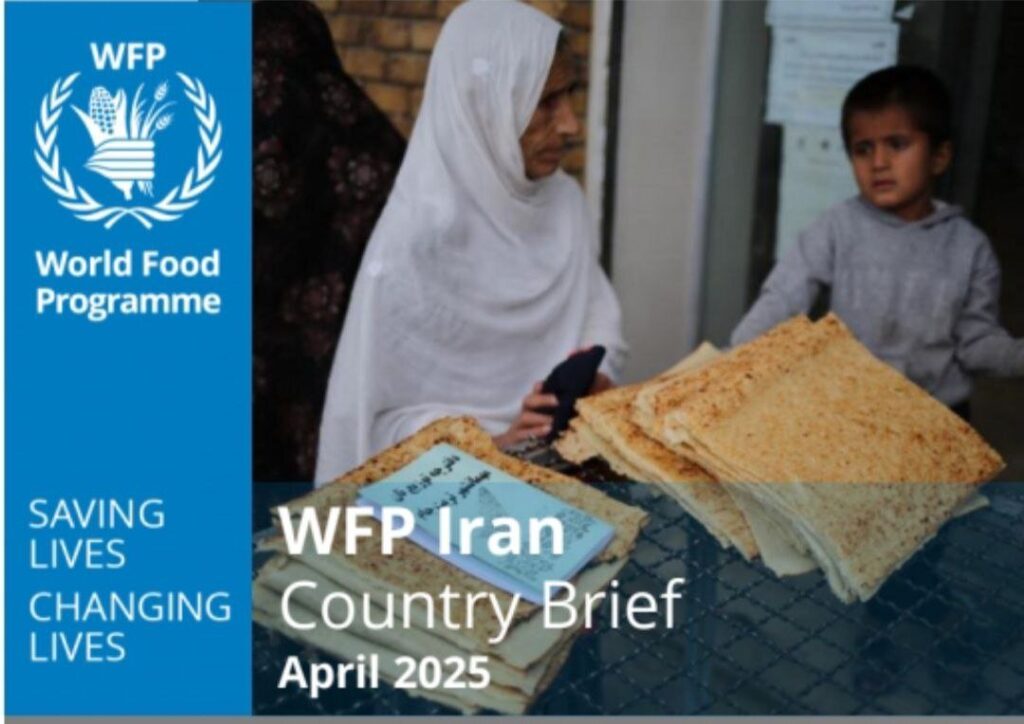Tehran – The World Food Program (WFP) published a report in April, explaining its activities in Iran.
In April, WFP Food Aid reached 32,233 beneficiaries, including refugees from Afghanistan and Iraq, as well as Iranian teachers. Refugees are supported with a food basket of staple foods containing fortified flour (12 kg per person) and vegetable oil (810 ml per person).
Under cash-based remittances, following the revision of WFP’s Minimum Expense Basket (MEB) in November 2024, the Centre for Alien and Foreign Immigration Affairs (CAFIA) confirmed the adjustments to cash transfer value starting in January.
In April, WFP continued to provide increased cash transfers to better support essential cost of living. This amount doubled from an IRR of 2.5 million (USD 3.6) to an IRR of 5 million (USD 7.3) for households with heads of men and a IRR of 3 million (USD 4.4) to an IRR of 6 million (USD 8.7) for female heads of women.
WFP provided 2,606 refugee girls with a monthly cash incentive of 2 million ($2.9 USD) IRRs in their bank accounts. This is part of WFP Iran’s efforts to promote education for refugee girls by providing cash for each month of regular school attendees.
By April, WFP Iran helped ease the financial burden associated with the gluten-free dietary needs of 52 refugee celiac patients from WFP beneficiaries by providing additional cash per person of rial 9.7 million (USD 14.19) as an alternative to regular food practices.
WFP’s school feeding program reached 9,239 refugee students and their teachers in April, with daily snacks consisting of milk, a date bar and fortified biscuits.
WFP supported 378 disability refugees across nine settlements in April, each receiving monthly cash assistance of US$3 million (USD4.3) in addition to regular aid. In April, support covered Karman, Lorestan, Western Azerbaijan, Fars, Huzestan, Markazi, Kurosan Razabi and Semnan provinces.
In April, to increase the economic resilience and self-sufficiency of 364 refugees (50% of women), WFP continued to support its 24 income-generating initiative across 18 settlements. Activities include welding, tailoring, baking, and agriculture.
WFP provided 35 home-based bakery ovens to the Jahrom settlement to support home-level bread production upon request from Kafia. This intervention was launched due to the absence of a bakery within the settlement that restricted access to beneficiaries to bread. Access to the oven was essential to meeting basic food needs, as beneficiaries rely on the flour on which WFP is distributed.
In 2024, WFP provided a combination of in-kind and cash assistance to address the food needs of Iran’s more than 33,000 vulnerable refugees. As a result, 70% were able to consume food at acceptable levels. This remains almost stable compared to the previous year.
Since August, WFP has increased the value of cash transfer eligibility by 25% and has actively helped to alleviate the immediate economic challenges reported by refugees.
The WFP has maintained its presence in Iran since 1987, focusing primarily on addressing the food security needs of refugees from Afghanistan. Iran has hosted refugees for over 40 years. Most refugees live in urban, urban and rural areas, often integrated with host communities, along with people in refugee-like circumstances. However, the most vulnerable refugees living in 20 settlements in 13 states face a volatile food security situation that requires ongoing humanitarian assistance from the WFP.
WFP provided eligible refugees living in their residences with food assistance, education support and livelihood opportunities through physical food distribution, unconditional cash transfers and capacity building initiatives.
Given the economic situation in Iran in recent years, Afghan refugees face many challenges, particularly among the people of the settlement, including a decline in income opportunities and a decline in purchasing power that have affected food security and well-being. In response, WFP coordinated the Provisional National Strategic Plan (ICSP 2023-2027) by changing cash qualifications and food, adjusting the number of beneficiaries, extending the ICSP for two years and extending the UN Sustainable Development Framework for two years, and ensuring the support of UNSDF 2023-2027, as needed.
The WFP carried out activities under the ICSP to maintain support for these refugees and address the increased humanitarian needs of these refugees. Living in 20 villages in 13 Iranian provinces, around 35,000 most vulnerable documented refugees benefiting from the food aid provided by WFP.
mt/mg

